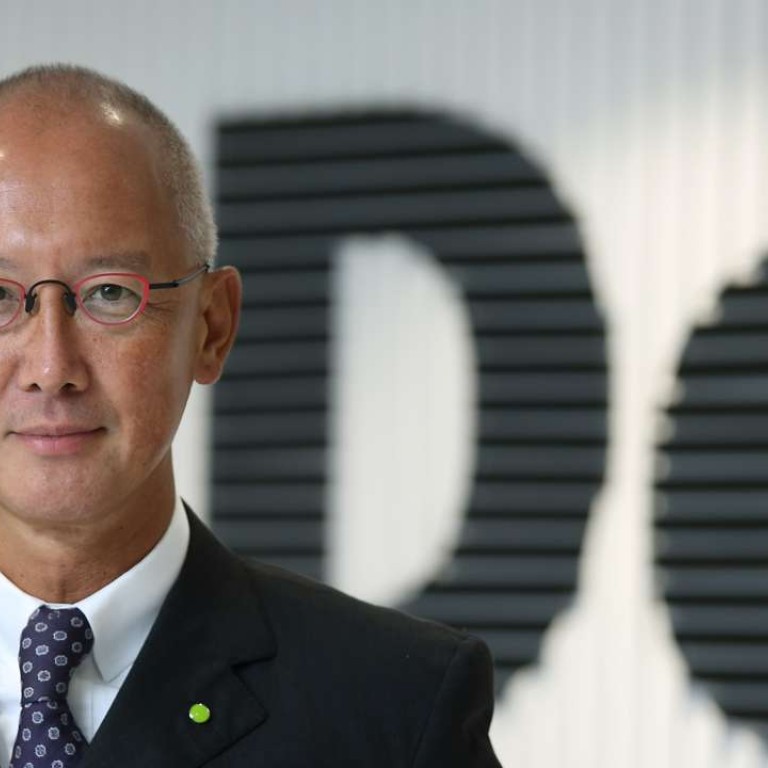
Deloitte China eyes more business from One Belt, One Road, Going Global strategies
Accounting firm to continue hiring people in mainland, HK this year despite sluggish economy, says new chairman
Deloitte China must move away from its bread and butter auditing business and strengthen its offerings in sectors like advisory services to cash in on the growing opportunities from China’s One Belt, One Road and Going Global strategies, according to a top company official.
“Going forward, there will be a huge demand for consultancy services like tax advisory services, mergers and acquisitions services, debt restructuring and other infrastructure investment services. Demand will continue to increase with the ‘One Belt, One Road’ and the ‘Going Global’ strategies,” Philip Tsai Wing-chung, the newly appointed chairman of Deloitte China said in an exclusive interview to the South China Morning Post.
Tsai took the helm at Deloitte China from Clement Hung, who has retired, and will be responsible for the mainland China, Hong Kong and Macau operations of the accounting firm.
The 57-year old Tsai has over three decades of experience in Deloitte and was auditor for several blue chips, such as China Merchants Group, mainly for their initial public offering and annual financial reports.
According to Tsai, auditing has been the firm’s mainstay in China for the past 20 years, driven largely by the growing number of mainland companies wanting to list their shares in Hong Kong. But this has changed in recent years, he said.
Advisory services are already becoming a lucrative business for Deloitte China and generates roughly the same amount of revenue as auditing. That is a marked difference from the trend five years ago, when auditing was 70 per cent of the revenue and only 30 per cent came from advisory work.
Tsai expects Hong Kong and mainland accounting firms to adopt the revenue generation model seen in the US and other Western nations, where auditing represents only 30 per cent of the revenue, while 70 per cent comes from advisory.
“Business volumes from auditing has not dropped that much for Deloitte China as the initial public offerings pipeline continues to be strong in Hong Kong. It (Hong Kong) was the world’s largest IPO market last year,” he said.

Among the Big Four accounting firms, Deloitte is the largest auditor for firms listed on Hong Kong’s main board, serving 370 companies, representing 18 per cent of the total.
“Over the years, our consultancy services have grown substantially. This is because many Chinese firms need these type of services. Most of the Chinese companies that are planning to expand abroad want us to provide advisory services on local taxation and laws, finding local partners or investment targets. This trend will only increase in the years ahead and that is why we are banking on consultancy services to be our future growth engine,” Tsai said.
China has encouraged insurance companies and other big players to invest abroad to diversify their business. Chinese companies also want to invest in many of the 60 countries under the “One Belt, One Road” scheme, which aims to build up infrastructure such as railways, roads, power plants and other facilities to promote trade between China and countries from India to Southeast Asia and the Middle East.
“Deloitte has operations in 55 out of the 60 countries in the One Belt, One Road scheme. Our partners in India, South East Asia and other countries can provide local knowledge for mainland and Hong Kong companies,” he said. Deloitte China has also sent some of its partners to overseas cities, such as Melbourne, to serve the mainland customers.
Though the mainland and Hong Kong economies are expected to remain sluggish this year, Tsai said it would not be a deterrent for hiring new talent. Deloitte plans to add 1,000 new employees in the mainland and 250 in Hong Kong in 2016, the same as last year.
“Deloitte has invested about US$400 million in the last 10 years to shore up its mainland operations. We believe there is always a need for accounting services. When the economy is good, we need accountants to do the IPOs. When the economy is bad, we need accountants to restructure company debt. Deloitte is confident about the long term development of China which is now the second largest economy in the world,” Tsai said.

